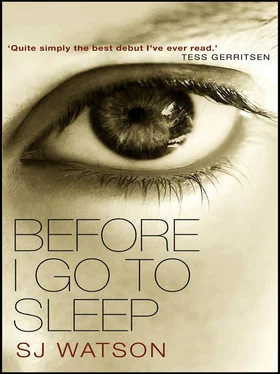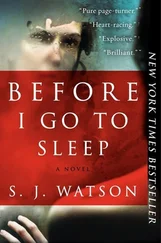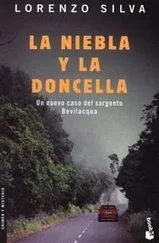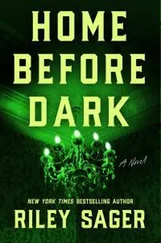S. Watson - Before I Go to Sleep - A Novel
Здесь есть возможность читать онлайн «S. Watson - Before I Go to Sleep - A Novel» весь текст электронной книги совершенно бесплатно (целиком полную версию без сокращений). В некоторых случаях можно слушать аудио, скачать через торрент в формате fb2 и присутствует краткое содержание. Год выпуска: 2011, Жанр: Триллер, на английском языке. Описание произведения, (предисловие) а так же отзывы посетителей доступны на портале библиотеки ЛибКат.
- Название:Before I Go to Sleep: A Novel
- Автор:
- Жанр:
- Год:2011
- ISBN:нет данных
- Рейтинг книги:3 / 5. Голосов: 1
-
Избранное:Добавить в избранное
- Отзывы:
-
Ваша оценка:
- 60
- 1
- 2
- 3
- 4
- 5
Before I Go to Sleep: A Novel: краткое содержание, описание и аннотация
Предлагаем к чтению аннотацию, описание, краткое содержание или предисловие (зависит от того, что написал сам автор книги «Before I Go to Sleep: A Novel»). Если вы не нашли необходимую информацию о книге — напишите в комментариях, мы постараемся отыскать её.
Before I Go to Sleep: A Novel — читать онлайн бесплатно полную книгу (весь текст) целиком
Ниже представлен текст книги, разбитый по страницам. Система сохранения места последней прочитанной страницы, позволяет с удобством читать онлайн бесплатно книгу «Before I Go to Sleep: A Novel», без необходимости каждый раз заново искать на чём Вы остановились. Поставьте закладку, и сможете в любой момент перейти на страницу, на которой закончили чтение.
Интервал:
Закладка:
Yes , I thought to myself, and we began.
The first photograph was black and white. A child — a girl, four, five years old — in the arms of a woman. The girl was pointing to something, and they were both laughing, and in the background, slightly out of focus, was a fence with a tiger resting on the other side of it. A mother, I thought to myself. A daughter. At a zoo. And then with a shock of recognition I looked at the child’s face and realized that the little girl was me, the mother my own. Breath caught in my throat. I couldn’t remember ever going to a zoo, yet here we were, here was evidence that we had. Me , I said silently, remembering what I had been told. Mother . I stared at the screen, trying to burn her image into my memory, but the picture faded and was replaced by another, also of my mother, now older, yet not seeming old enough to need the walking stick on which she is leaning. She was smiling but looked exhausted, her eyes sunk deep in her thin face. My mother, I thought again, and other words came, unbidden: in pain . I closed my eyes involuntarily, had to force them open again. I began to grip the bulb in my hand.
The images came quickly then, and I recognized only a few. One was of the friend I had seen in my memory, and with a thrill I recognized her almost straight away. She looked as I had imagined her, dressed in old blue jeans and a T-shirt, smoking, her red hair loose and untidy. Another picture showed her with her hair cut short and dyed black, and a pair of sunglasses pushed high on her head. It was followed by a photograph of my father — the way he looked when I was a little girl, smiling, happy, reading a newspaper in our front room — and then one of me and Ben, standing with another couple I didn’t recognize.
Other photos were of strangers. A black woman in a nurse’s uniform, another woman dressed in a suit, sitting in front of a bookcase, peering over the top of her half-moon glasses with a grave expression. A man with ginger hair and a round face, another with a beard. A child, six or seven, a boy eating an ice cream and then, later, the same boy, sitting at a desk, drawing. A group of people, arranged loosely, looking at the camera. A man, attractive, his hair black and slightly longish, with a pair of dark-rimmed glasses framing narrowed eyes and a scar running down the side of his face. They went on and on, these photographs, and as they did so I looked at them all, and tried to place them, to remember how — or even whether — they were woven into the tapestry of my life. I did as I had been asked. I was good, and yet I felt myself begin to panic. The whirr of the machine seemed to rise in pitch and volume until it became an alarm, a warning, and my stomach clenched. I could not breathe, and I closed my eyes, and the weight of the blanket began to press down on me, heavy as a marble slab, so that it felt like I was drowning.
I squeezed my right hand, but it balled itself into a fist, closing on nothing. Nails bit into flesh; I had dropped the bulb. I called out, a wordless cry.
‘Christine,’ came a voice in my ear. ‘Christine.’
I couldn’t tell who it was, or what they wanted me to do, and I cried out again, and began kicking the blanket off my body.
‘Christine!’
Louder now, and then the siren noise whirred to a halt, a door crashed open, and there were voices in the room, and hands on me, on my arms and legs, and across my chest, and I opened my eyes.
‘It’s OK,’ said Dr Nash in my ear. ‘You’re OK. I’m here.’
Once they’d calmed me down with reassurances that everything was fine — and given me back my handbag, my earrings and my wedding ring — Dr Nash and I went to a coffee bar. It was along the corridor, small, with orange plastic chairs and yellowing Formica-topped tables. Trays of tired pastries and sandwiches sat wilting in the harsh light. I had no money in my purse, but I let Dr Nash buy me a cup of coffee and a piece of carrot cake and then selected a seat by the window while he paid. Outside was sunny, the shadows long in the courtyard of grass. Purple flowers dotted the lawn.
Dr Nash scraped his chair under the table. He seemed much more relaxed, now that the two of us were alone together. ‘There you go,’ he said, setting the tray in front of me. ‘Hope that’s OK.’
I saw that he had selected tea for himself; the bag still floated in the syrupy liquid as he added sugar from the bowl in the centre of the table. I took a sip of my drink, and grimaced. It was bitter, and too hot.
‘It’s fine,’ I said. ‘Thank you.’
‘I’m sorry,’ he said, after a moment. At first I thought he was talking about the coffee. ‘I had no idea that you would find it so distressing in there.’
‘It’s claustrophobic,’ I said. ‘And noisy.’
‘Yes, of course.’
‘I dropped the emergency button.’
He said nothing, but instead stirred his drink. He fished the teabag out and deposited it on the tray. He took a sip.
‘What happened?’ I said.
‘Difficult to say. You panicked. It’s not that uncommon. It isn’t comfortable in there, as you said.’
I looked down at my slice of cake. Untouched. Dry. ‘The photographs. Who were they? Where did you get them?’
‘They were a mixture. Some of them I got from your medical files. Ben had donated them, years ago. I asked you to bring a couple from home for the purposes of this exercise — you said they’d been arranged around your mirror. Some I provided — of people you’ve never met. What we call controls. We mixed them all up together. Some of the images were people you knew at a very young age, people you should, or might, remember. Family. Friends from school. The rest were people from the era of your life that you definitely can’t remember. Dr Paxton and I are trying to find out whether there’s a difference in the way you attempt to access memories from these different periods. The strongest reaction was to your husband, of course, but you reacted to others. Even though you don’t remember the people from your past, the patterns of neural excitation are definitely there.’
‘Who was the woman with red hair?’ I said.
He smiled. ‘An old friend, perhaps?’
‘Do you know her name?’
‘I’m afraid I don’t. The photos were in your file. They weren’t labelled.’
I nodded. An old friend . I knew that, of course — it was her name I so wanted.
‘You said that I reacted to the pictures, though?’
‘Some of them, yes.’
‘That’s good?’
‘We’ll need to look at the results in more detail before we really know what conclusions we can draw. This work is very new,’ he said. ‘Experimental.’
‘I see.’ I cut off a corner of the carrot cake. It too was bitter, the icing too sweet. We sat in silence for a while. I offered him my cake and he declined, patting his stomach. ‘Have to watch this!’ he said, even though I could see no reason for him to worry, yet. His stomach was mostly flat, though it looked to be the sort that would develop a paunch. For now, though, he was young, and age had hardly touched him.
I thought of my own body. I am not fat, not even overweight, yet still it surprises me. When I sit it takes a different shape from the one I am expecting. My buttocks sag, my thighs rub as I cross them. I lean forward to reach for my mug and my breasts shift in my bra, as if reminding me that they exist. I shower and feel a slight wobbling of the skin under my arms, barely perceptible. There is more of me than I think, I take up more space than I realize. I am not a little girl, compact, my skin tight on my bones, not even a teenager, my body beginning to layer its fat.
I looked at the uneaten cake and wondered what will happen in the future. Perhaps I will continue to expand. I will grow pudgy and then fat, bloating up and up like a party balloon. Or else I will stay the same size as I am now, never getting used to it, instead watching as the lines on my face deepen and the skin on my hands grows as thin as that of an onion and I turn into an old woman, stage by stage, in the bathroom mirror.
Читать дальшеИнтервал:
Закладка:
Похожие книги на «Before I Go to Sleep: A Novel»
Представляем Вашему вниманию похожие книги на «Before I Go to Sleep: A Novel» списком для выбора. Мы отобрали схожую по названию и смыслу литературу в надежде предоставить читателям больше вариантов отыскать новые, интересные, ещё непрочитанные произведения.
Обсуждение, отзывы о книге «Before I Go to Sleep: A Novel» и просто собственные мнения читателей. Оставьте ваши комментарии, напишите, что Вы думаете о произведении, его смысле или главных героях. Укажите что конкретно понравилось, а что нет, и почему Вы так считаете.












